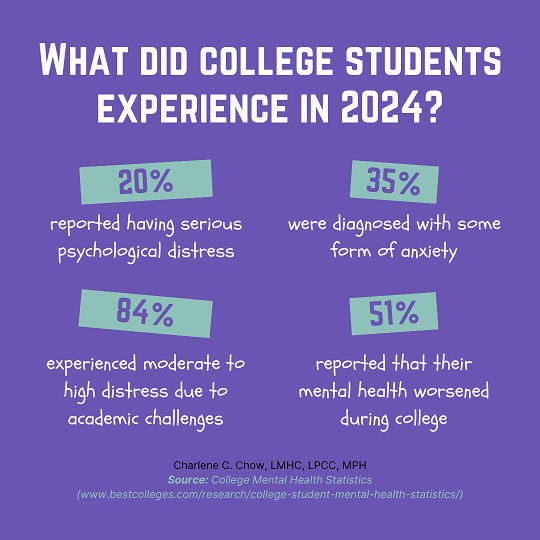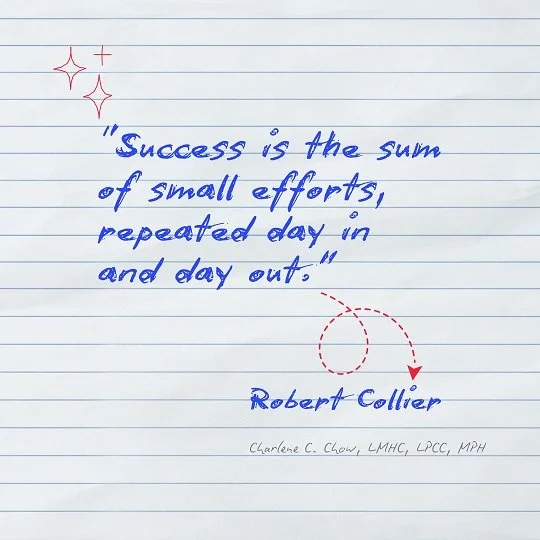The Stressed Student's Guide to Self-Care
While I focus on adult students here, these stressors affect students of all ages — and by extension, their guardians. So if you're a parent of a school-aged child, take note!
With back-to-school season now in full swing, it’s a stressful time for students and their families.
Each fall semester brings a whirlwind of new classes, academic challenges, and evolving social expectations that push our wellbeing to the backburner.
In my practice, I see this regularly with adult clients who are either undergraduate/graduate students or parents supporting children in school.
It’s a perfect coincidence that August is also National Wellness Month, which encourages us to focus on self-care and healthy routines.
Let’s take this moment to reflect on specific stressors you might expect this season, and how to shift your priorities to build resilience while navigating your academic journey.
What’s really stressing students?
Statistics indicate the pressure on students today extends far beyond simply getting good grades.
Recognizing these challenges for what they are — valid, difficult experiences — is the crucial first step toward building effective coping mechanisms.
Here are some of the most common stressors I see in my practice:
Academic rigor
As students advance to higher levels of education, the sheer volume and complexity of coursework can be overwhelming.
This can be even harder if English is not your first language, you’re a person of color, or you identify as neurodiverse.
Poor time management and bad habits like procrastination and perfectionism can also cause anxiety to snowball.
Financial strain
With the ballooning costs of tuition and daily life, students frequently carry a heavy burden of financial stress.
Those working a part-time job bear even more mental and emotional labor.
A lack of resources can lead to helplessness, financial fragility and a scarcity mindset.
Social adjustments
Starting on a new campus or reuniting with your cohort comes with shifting interpersonal dynamics and pressure to “fit in.”
Consider how challenging it is to make friends in a new place without losing touch with old ones (who may also be long-distance).
Some may be living alone or away from home for the first time, having to manage homesickness, grief, isolation, and all of your daily responsibilities at once.
the future beyond
For those nearing the end of their academic journey, the “what ifs” of a never-ending job search, dissatisfaction with your field, or the need for further education can create major stress.
Unfortunately, these hypothetical questions only fuel more uncertainty in the form of imposter syndrome and anticipatory anxiety about the future, which can further manifest in depression, burnout, even physical injury and medical issues.
Asking “what comes next?” can be paralyzing.
What can students do to manage their stress?
To tackle such big questions, we must break them down, bit by bit.
Just as your laptop needs regular updates and charging, your mind and body need intentional care to thrive — that is, self-care.
REMEMBER:
Self-care isn't just FUN activities; it's also the UN-FUN stuff that nevertheless nourishes you.
As I tell my clients: you might hate going to the dentist, but it's an important part of caring for yourself.
Bottom line: you don’t have to like it for it to be good self-care.
To tackle this, I’ve broken it down into 5 subcategories with actionable examples for each:
Academic self-care
Study smart, not hard.
Map out the semester for better organization.
Break big assignments into small, manageable pieces.
Prioritize rather than stumble through work as it comes.
Block off study times and deadlines on the calendar, like they’re appointments you cannot miss.
Set SMART goals.
Are your goals Specific, Measurable, Achievable, Relevant, and Timely?
Aim for progress, not perfection.
Celebrate every victory, no matter how small!
Use all available campus resources — your tuition paid for it!
If you need special accommodations, just ask.
Look into tutoring, academic advising, and the health/counseling center.
Physical Self-care
Get good sleep.
Sleep is NOT optional — neither is sleep hygiene.
Aim for 7-8 hours nightly (unfortunately, sleep deficit is exponential, not linear!).
All-nighters may seem necessary, but high quality rest is key for cognitive function, emotion regulation, and resilience.
Eat nutritious, balanced meals.
Limit processed foods and excessive caffeine.
Let your body’s natural hunger/fullness cues guide you toward intuitive eating.
Move your body.
Visit your campus gym or find free at-home workouts online.
Even a 10-minute walk can reduce stress, boost mood, and improve focus. Just get outside and start moving.
Financial self-care
Review your budget.
Get a sense of where you’re struggling, where your money is coming from, and where it’s going.
Beyond the “dollar” amount, money is also comfort, access, peace of mind, opportunity, love, etc. Do your expenses align with your personal values?
Seek financial advice.
Visit your campus’ financial aid office for personalized support.
Consider off-campus financial counseling to build financial literacy.
Search for financial coaching where you live — you might be surprised at what’s available. (In my home state of Massachusetts, for example, the city of Boston offers free 1:1 coaching to residents. Additionally, MassCap can connect you with agencies to support your financial health.)
Social Self-Care
Set boundaries to protect your time and energy.
Say “no” to social events when you need to recharge or study.
Shut off the schoolwork when it’s time to rest — work-life balance is critical for recovery!
Seek small, positive interactions to combat feelings of isolation.
Attend new student orientations and explore campus ahead of time.
Join clubs, study groups, or volunteer events that speak to you.
Don’t forget your existing connections.
Schedule regular chats with core supports like family and childhood friends.
Maintain relationships that you can rely on for comfort, perspective, and to continuously show up for you.
Emotional Self-Care
Cultivate mindfulness to manage uncomfortable feelings.
Guided meditation apps provide structure; even 5 minutes daily can ease racing thoughts and improve focus.
Practice simply pausing and sitting with your thoughts for a few minutes, observing what comes up mentally, emotionally, and physically.
Check in with yourself often: how are you doing?
Practice stress management.
I don’t mean “avoid stressful things” — instead, use stress reduction techniques like deep breathing, journaling, mood-matching with music, and hobbies.
Don’t just rely on venting to others — find your solo stressbusters.
Practice self-compassion.
Talk to yourself in a gentle, empathetic manner, extending the same grace you would to a best friend.
Practice changing self-judgments into positive self-talk until self-compassion becomes second-nature.
If you’re wondering WHEN to seek professional support, it may already be time…
Even with these strategies, your burdens may feel too heavy to carry alone.
Consider seeking more support if you’re noticing persistent sadness, anxiety, hopelessness, significant changes in sleep or appetite, or difficulty keeping up with daily life.
Your wellbeing is foundational to your academic success — and to living a healthier, more balanced life.
If you or someone you know is struggling, reaching out is the next step.
In my practice, I work with quite a few adult students and parents who find back-to-school season difficult.
If this hits home for you, consider scheduling a complimentary 10-minute phone consultation with me here. I would be honored to offer you a safe space in which you can process your experiences and move toward your academic and professional goals without limitation.
Where else can you find support?
National organizations:
The Jed Foundation (JED, formerly ULifeline) works directly with colleges and universities to support their mental health services.
National Alliance on Mental Illness (NAMI) offers support groups and educational programs across the U.S.
Active Minds facilitates peer-to-peer mental health support among college students nationwide.
Crisis lines for psychiatric emergencies:
National Grad Student Crisis Line: (877) 472-3457 or gradresources.org
National Suicide & Crisis Lifeline: 988 or www.988lifeline.org
Crisis Text Line: text “HOME” to 741-741
The Steve Fund (for people of color specifically): text “STEVE” to 741-741
National Domestic Violence Hotline: (800) 799-SAFE (7233)
The Trevor Project Hotline (for LGBTQIA+ folx specifically): (866) 488-7386 or text 678-678 or chat online at thetrevorproject.org
National Sexual Assault Hotline: (800) 656-HOPE (4673)
SAMHSA (Substance Abuse & Mental Health Services Administration) National Helpline: (800) 662-4357
It is brave to ask for help.
There is no shame in seeking support when you need it.
By proactively managing stress and all elements of your health, you can move from simply surviving to thriving.
It is brave to ask for help. There is no shame in seeking support when you need it. By proactively managing stress and all elements of your health, you can move from simply surviving to thriving.
Disclaimer: This blog is intended for informational purposes only, and does not constitute medical or psychiatric advice. Please consult with a qualified healthcare professional directly for personalized guidance and support.


